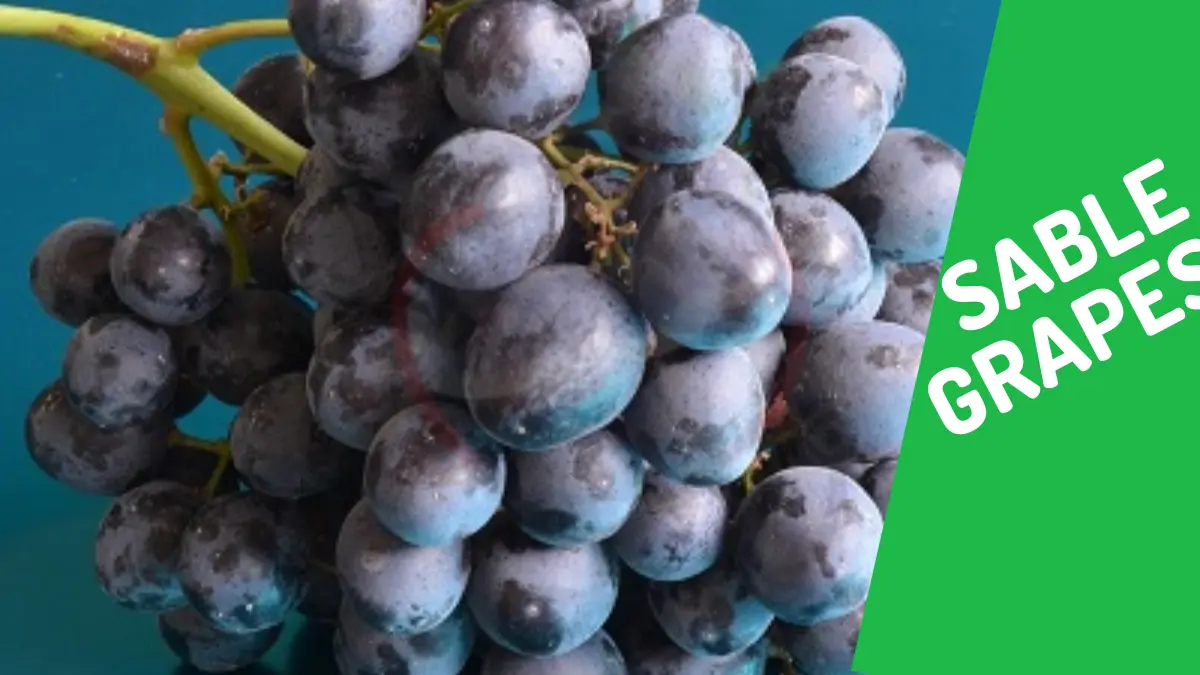Sable grapes, also known as “Uva Sable” in some regions, are a unique variety of grapes characterized by their dark, almost black skin and lusciously sweet flavor. [1]
These grapes belong to the Vitis vinifera species and are often found in select regions with favorable climates for grape cultivation.
Sable grapes, an exquisite fruit known for its distinctive flavor and versatility, have been capturing the hearts and palates of food enthusiasts and health-conscious individuals alike.
In this article, we will delve into the world of sable grapes, exploring their origins, nutritional value, health benefits, culinary applications, and even their role in the wine industry.

Origin of Sable Grapes
The history of sable grapes dates back centuries. It is believed that these grapes originated in the Mediterranean region, where the warm, sunny climate provided the ideal conditions for their growth.
Over time, they have spread to other parts of the world, including California and South America.
Varieties of Sable Grapes
Sable grapes come in several varieties, each with its own distinct taste and appearance. Some popular variations include Muscat of Alexandria, Black Corinth, and Black Monukka.
These grape varieties offer a spectrum of flavors, from honey-like sweetness to a more intense, almost chocolatey taste.
Nutritional Value of Sable Grapes
- Sable grapes are not just delicious; they are also packed with essential nutrients.
- They are a good source of vitamins, particularly vitamin C and vitamin K, as well as minerals like potassium and magnesium.
- They are rich in antioxidants, which have various health benefits.
Health Benefits of Sable Grapes
1: Rich Source of Antioxidants
Sable grapes are an excellent source of antioxidants, particularly anthocyanins and resveratrol.
These antioxidants play a crucial role in protecting cells from damage caused by free radicals.
2: Promotes Heart Health
The antioxidants in Sable grapes, especially resveratrol, have been linked to improved heart health.
Resveratrol may help lower LDL (bad) cholesterol and raise HDL (good) cholesterol levels. It may also help prevent blood clots and reduce inflammation in the arteries.
3: May Support Blood Sugar Control
Some studies suggest that Sable grapes may help regulate blood sugar levels.
The anthocyanins in Sable grapes may improve insulin sensitivity, which helps the body use insulin more effectively to regulate blood sugar.
4: Anti-Inflammatory Properties
Sable grapes’ antioxidant content may also contribute to anti-inflammatory effects.
Chronic inflammation is associated with various health problems, including heart disease, arthritis, and cancer.
The antioxidants in Sable grapes may help reduce inflammation throughout the body.
5: May Protect Against Cancer
Studies suggest that the resveratrol in Sable grapes may have anti-cancer properties.
Resveratrol may help reduce the growth and spread of cancer cells and protect against DNA damage.
6: Potential Benefits for Skin and Hair Health
Sable grapes’ antioxidant content may also contribute to improved skin and hair health.
Antioxidants may help protect skin cells from damage caused by sun exposure and environmental factors, potentially reducing wrinkles and promoting skin elasticity.
They may also help improve hair health by protecting hair follicles from damage.
7: Good Source of Nutrients
Sable grapes are a good source of various nutrients, including potassium, vitamin C, and fiber.
Potassium is important for regulating blood pressure, vitamin C is an essential antioxidant, and fiber promotes digestive health and helps regulate blood sugar levels.
Sable Grapes in Wine Industry
Sable grapes are a favorite among winemakers due to their unique flavors. They are often used in the production of sweet, dessert wines, and their distinct taste can elevate the quality of the wine.
Sable grapes are a delightful fruit known for their sweet flavor, nutritional value, and versatility in both culinary and viticulture pursuits.
Whether you enjoy them fresh, in a delicious dessert, or as a fine wine, sable grapes are a unique treat that deserves a place in your repertoire of flavors.
FAQs about Sable Grapes
Are sable grapes genetically modified?
No, sable grapes are a natural variety of grapes and are not genetically modified.
Can I grow sable grapes in a cold climate?
Sable grapes thrive in warm climates, making them challenging to grow in cold regions.
Do sable grapes taste like regular grapes?
Sable grapes have a distinct sweet flavor that sets them apart from traditional grape varieties.
What is the best way to use sable grapes in cooking?
Sable grapes are excellent in both sweet and savory dishes. They can be used in salads, desserts, and even paired with cheese.
Is there a specific season for sable grapes?
Sable grapes are typically in season during late summer and early fall, depending on the region.

